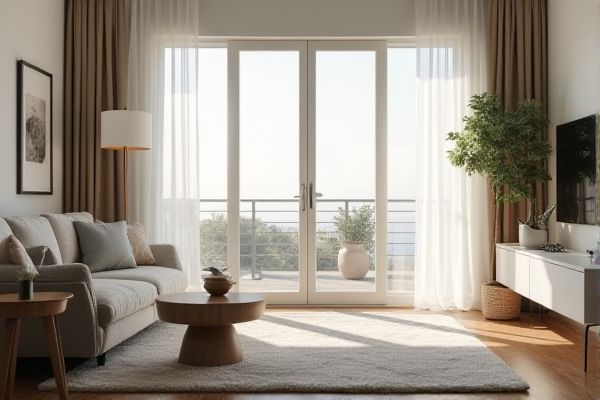
Waterproof blinds offer durable, moisture-resistant window coverage that combines both privacy and light control, ideal for bathrooms or kitchens. Explore the article to understand how waterproof blinds compare to privacy film, helping you choose the perfect solution for Your space.
Table of Comparison
| Feature | Waterproof Blinds | Privacy Film |
|---|---|---|
| Material | Water-resistant PVC, vinyl, or aluminum | Adhesive vinyl or polyester film |
| Installation | Mounted on window frame, requires tools | Applied directly on glass, peel-and-stick |
| Water Resistance | Fully waterproof, suitable for wet areas | Water-repellent but not fully waterproof |
| Privacy Level | Adjustable slats for variable privacy | Opaque or frosted for static privacy |
| Light Control | Adjustable light filtering with slats | Diffuses or blocks light but fixed |
| Durability | High durability, resistant to moisture and mold | Moderate durability, may peel over time |
| Maintenance | Easy to clean with a damp cloth | Requires gentle cleaning to avoid damage |
| Cost | Higher initial cost | Lower cost, budget-friendly option |
| Aesthetic Options | Variety of colors and styles | Limited design options, mostly frosted or tinted |
| Best Use | Bathrooms, kitchens, humid environments | Offices, living rooms, permanent privacy needs |
Introduction to Waterproof Blinds and Privacy Film
Waterproof blinds offer durable, moisture-resistant window coverings ideal for kitchens, bathrooms, and other humid areas, providing both style and protection. Privacy film adheres directly to glass, enhancing privacy while allowing natural light to pass through, making it perfect for office spaces or rooms with high exposure. Your choice depends on whether you prioritize physical barrier benefits or flexible, light-filtering privacy solutions.
Key Differences Between Waterproof Blinds and Privacy Film
Waterproof blinds offer adjustable light control and are made from moisture-resistant materials suited for wet environments, while privacy film is a thin adhesive layer applied to glass surfaces to reduce visibility without blocking light. Waterproof blinds provide physical coverage and can be easily cleaned, making them ideal for bathrooms or kitchens, whereas privacy film is a cost-effective solution that preserves natural light but offers less flexibility in light adjustment. Installation of waterproof blinds involves mounting hardware and maintenance of moving parts, whereas privacy film requires careful application to achieve bubble-free adhesion on windows or glass doors.
Benefits of Waterproof Blinds
Waterproof blinds offer superior moisture resistance, making them ideal for high-humidity areas such as bathrooms and kitchens. They provide enhanced durability compared to privacy film, resisting warping, mold, and mildew buildup over time. These blinds also allow precise control of light and privacy while maintaining easy cleaning and maintenance.
Advantages of Privacy Film
Privacy film offers a versatile and cost-effective solution for enhancing window privacy without obstructing natural light. Its easy installation and removable nature make it ideal for renters or those seeking temporary privacy adjustments. Unlike waterproof blinds, privacy film requires minimal maintenance and is less prone to damage from moisture or humidity.
Installation Process: Blinds vs Privacy Film
Waterproof blinds installation involves mounting brackets and securing the blinds inside or outside the window frame, often requiring precise measurements and occasional drilling for a sturdy fit. Privacy film applies directly to the glass surface using a self-adhesive backing, allowing for a quick, bubble-free installation with a squeegee and minimal tools. While blinds offer adjustable coverage and can be repositioned easily, privacy film provides a permanent solution that is less intrusive but harder to remove without damage.
Durability and Maintenance
Waterproof blinds offer superior durability as they are typically made from materials like vinyl or aluminum that resist moisture and prevent mold growth, making them ideal for wet environments such as bathrooms or kitchens. Privacy film, while effective in creating a frosted or opaque appearance on glass, may require frequent replacement due to peeling, bubbling, or discoloration caused by exposure to humidity and sunlight. Your choice between waterproof blinds and privacy film should consider long-term maintenance needs, with blinds requiring less upkeep and providing robust protection against moisture damage.
Cost Comparison
Waterproof blinds typically cost between $30 to $100 per window, depending on material and customization, while privacy film ranges from $10 to $50 per window, offering a more budget-friendly option. Installation costs for blinds can be higher due to mounting requirements, whereas privacy film often allows for DIY application, reducing overall expenses. Long-term maintenance expenses also favor privacy film, as it requires less upkeep compared to blinds that may need repairs or replacements over time.
Aesthetic and Design Options
Waterproof blinds offer a wide range of aesthetic and design options, including various colors, patterns, textures, and materials such as vinyl or faux wood that complement modern and traditional interiors. Privacy film primarily provides a sleek, minimalist look with translucent or frosted finishes, allowing natural light while maintaining privacy without bulky installations. Choosing between the two depends on desired visual impact, with blinds adding dimensionality and privacy film offering subtle elegance and unobtrusive design.
Best Applications for Each Solution
Waterproof blinds are ideal for bathrooms, kitchens, and outdoor spaces where moisture resistance and durability are crucial, providing adjustable light control and privacy. Privacy film suits windows in office buildings, bedrooms, and storefronts to enhance privacy without obstructing natural light and offers easy installation on glass surfaces. Both solutions cater to different needs: waterproof blinds excel in wet environments, while privacy films are perfect for discreet visibility and aesthetic enhancement.
Choosing the Right Option for Your Space
Waterproof blinds provide durable, moisture-resistant coverage ideal for bathrooms and kitchens, offering adjustable light control and enhanced privacy. Privacy film serves as a cost-effective, easy-to-install alternative that adds opaque or decorative layers to windows without blocking natural light. Your choice depends on the level of moisture exposure, desired aesthetic, and flexibility in light management for your specific space.
 homyna.com
homyna.com